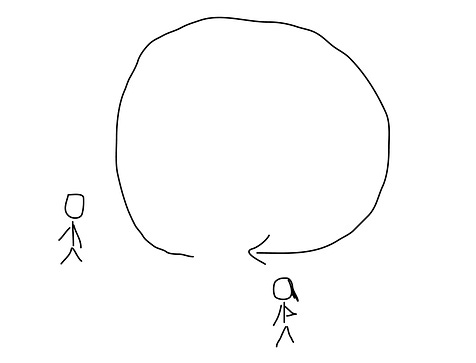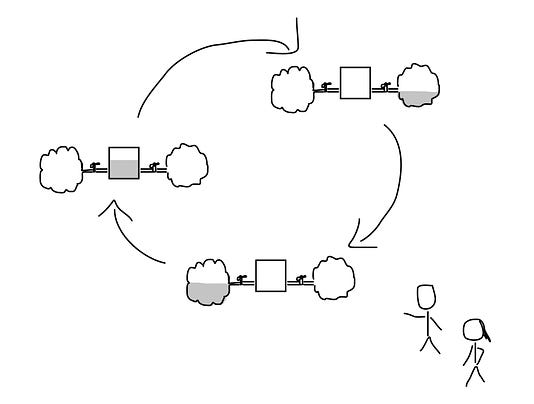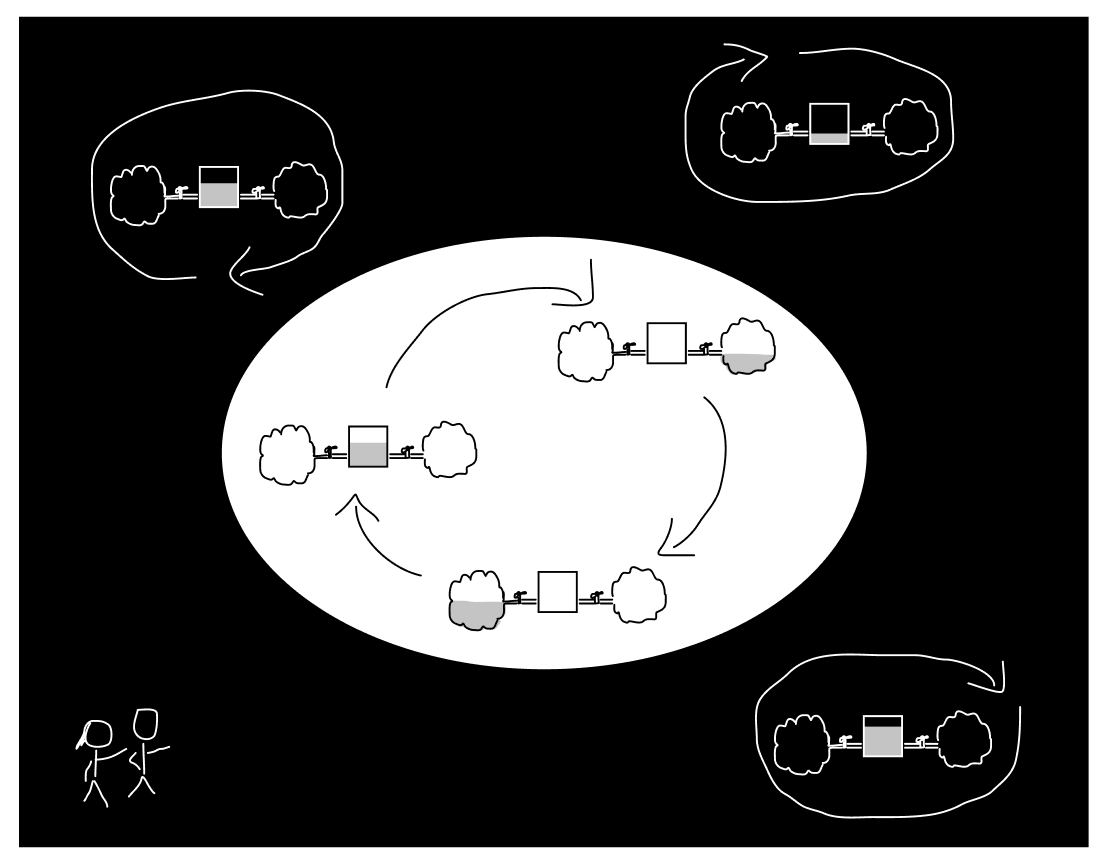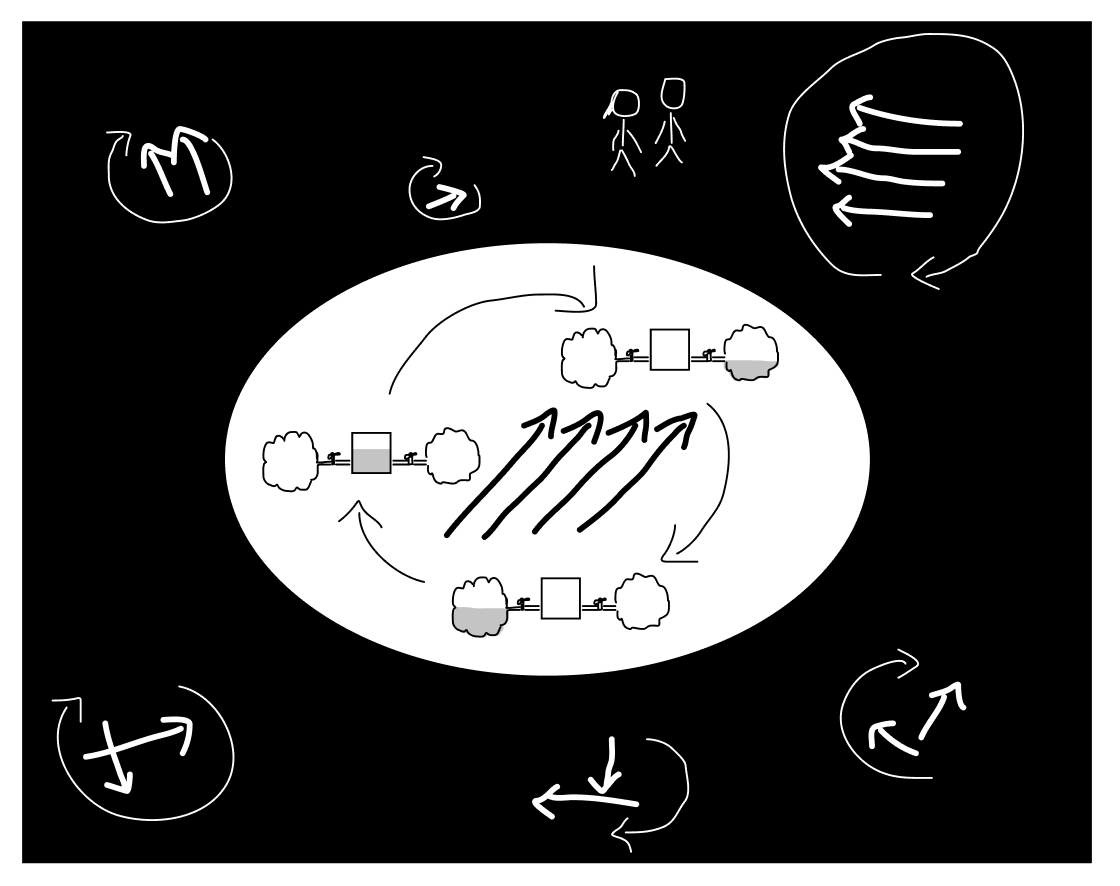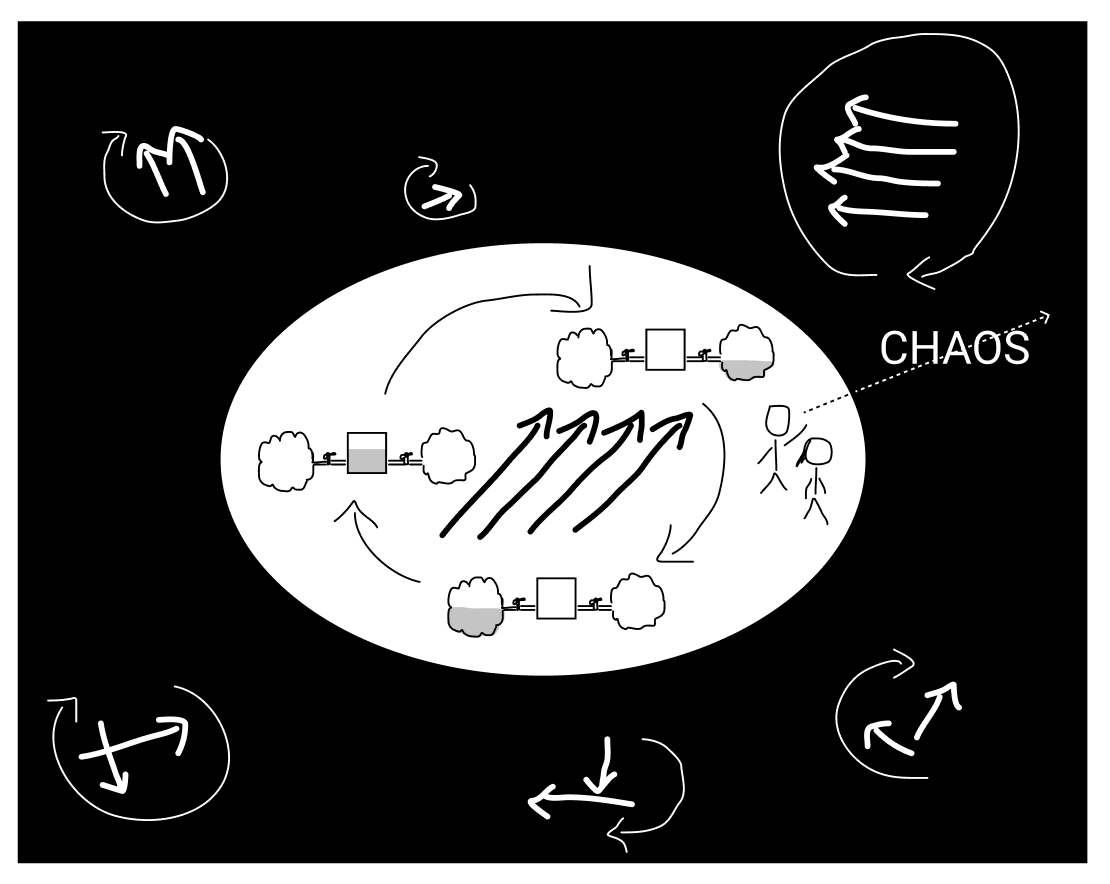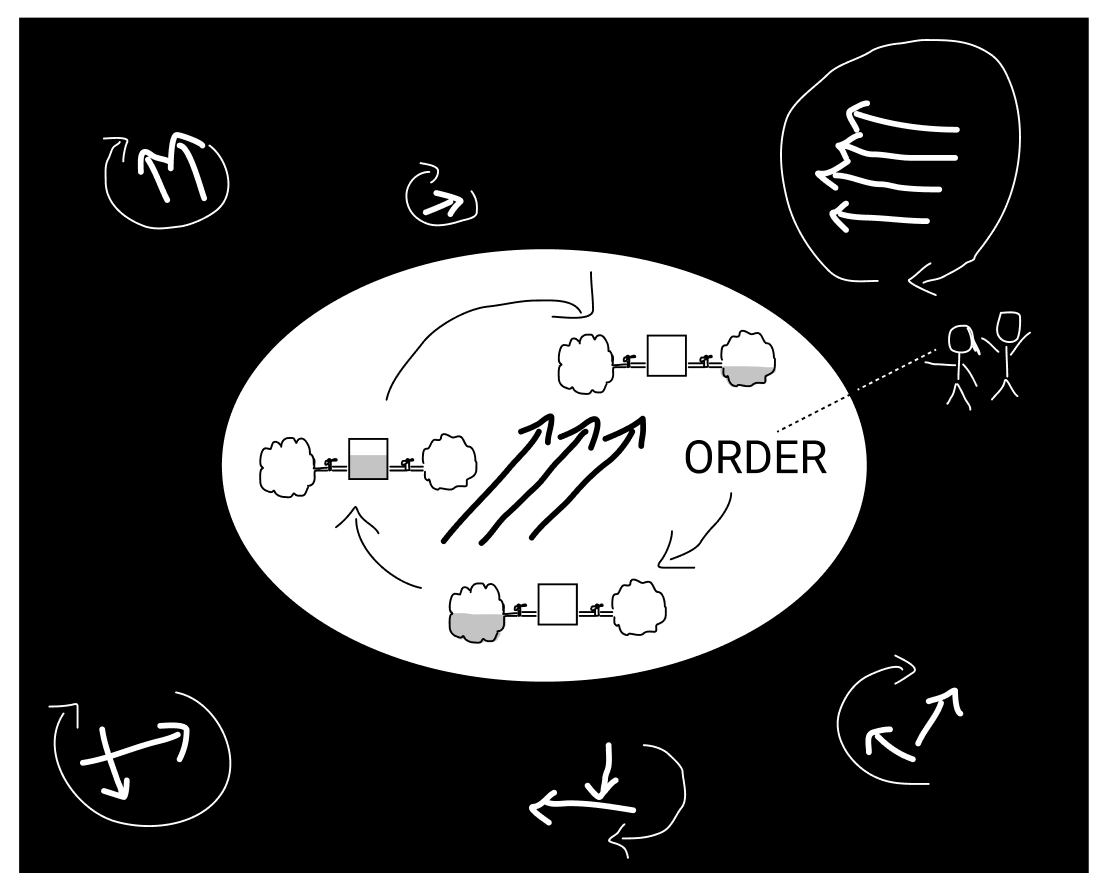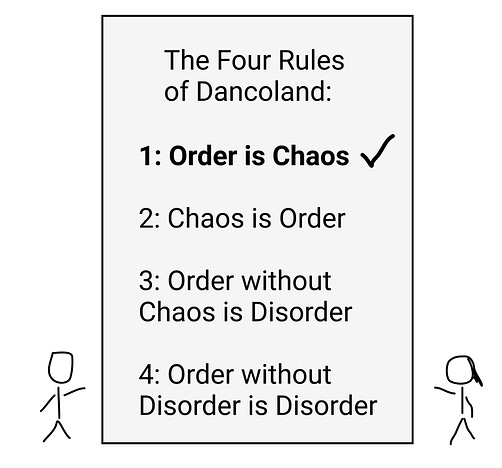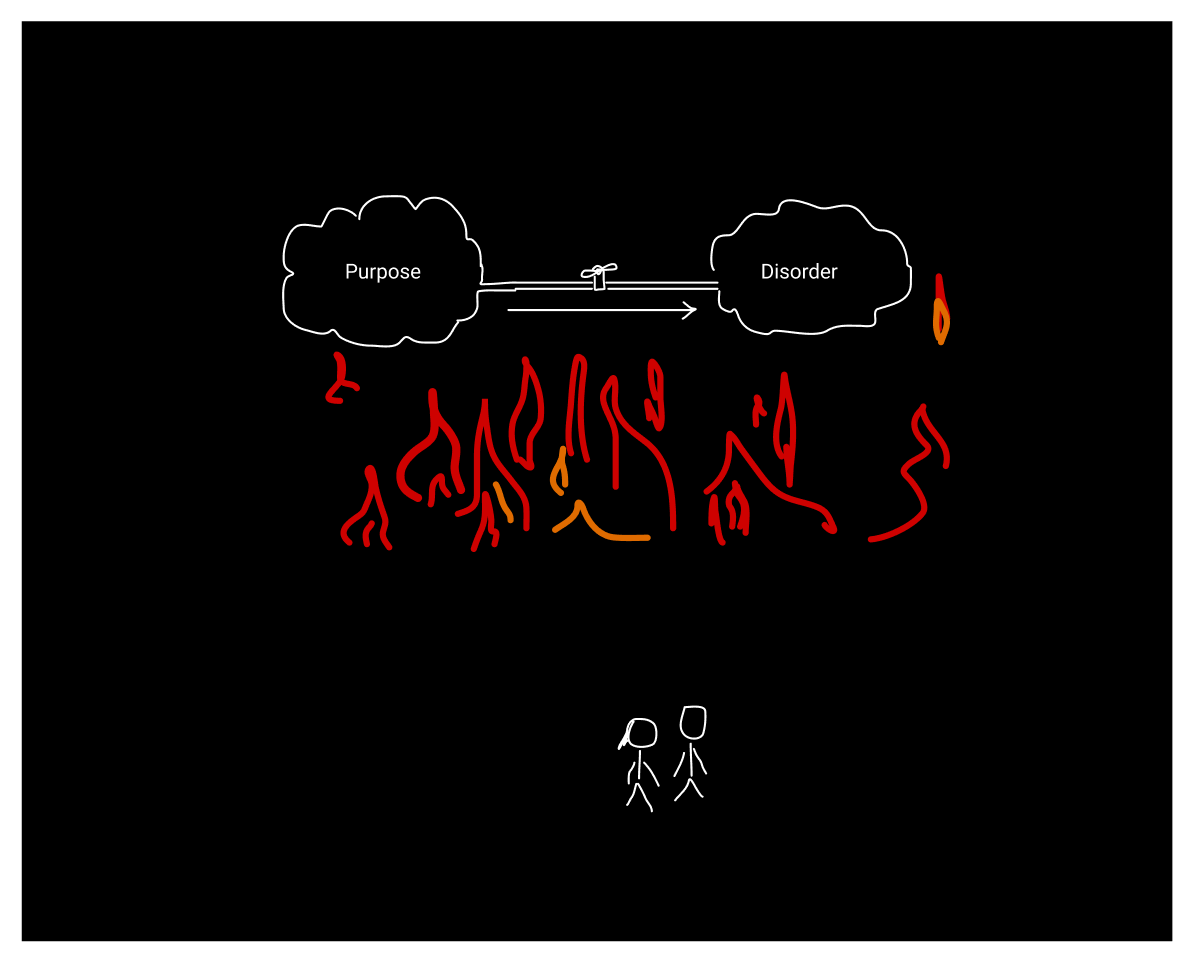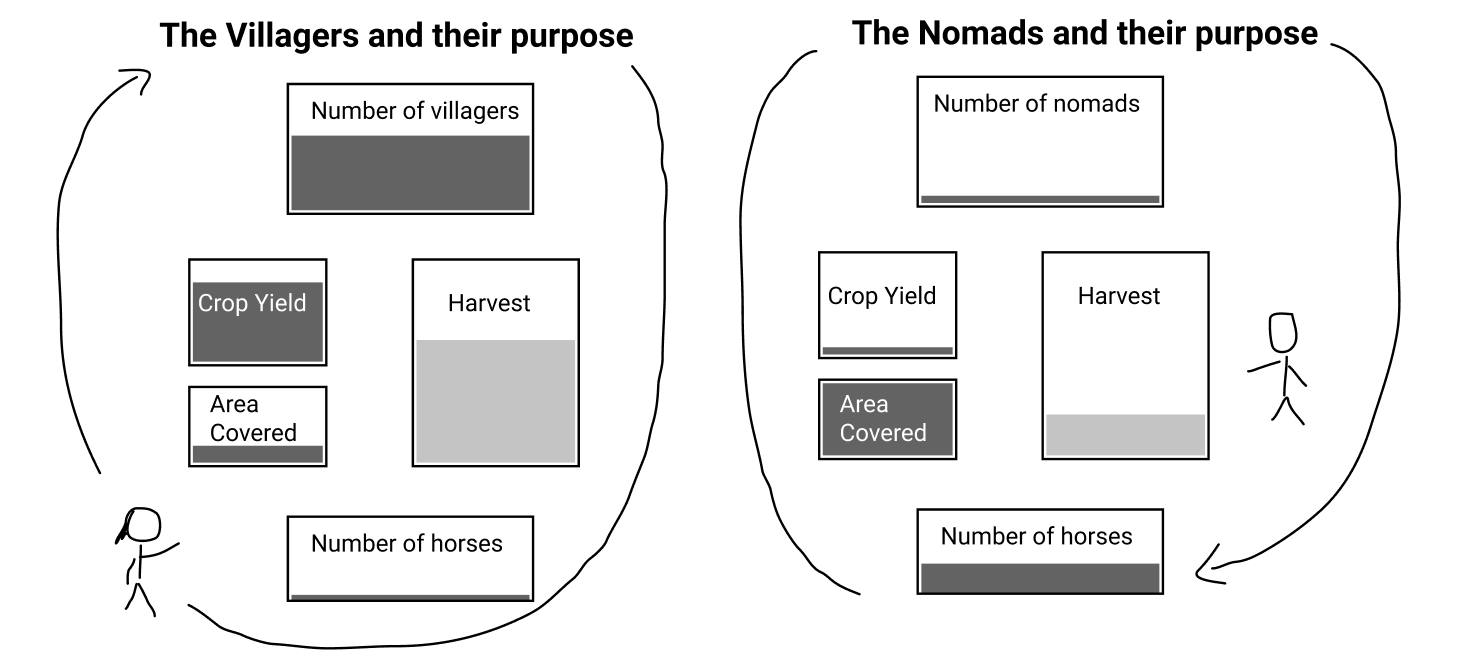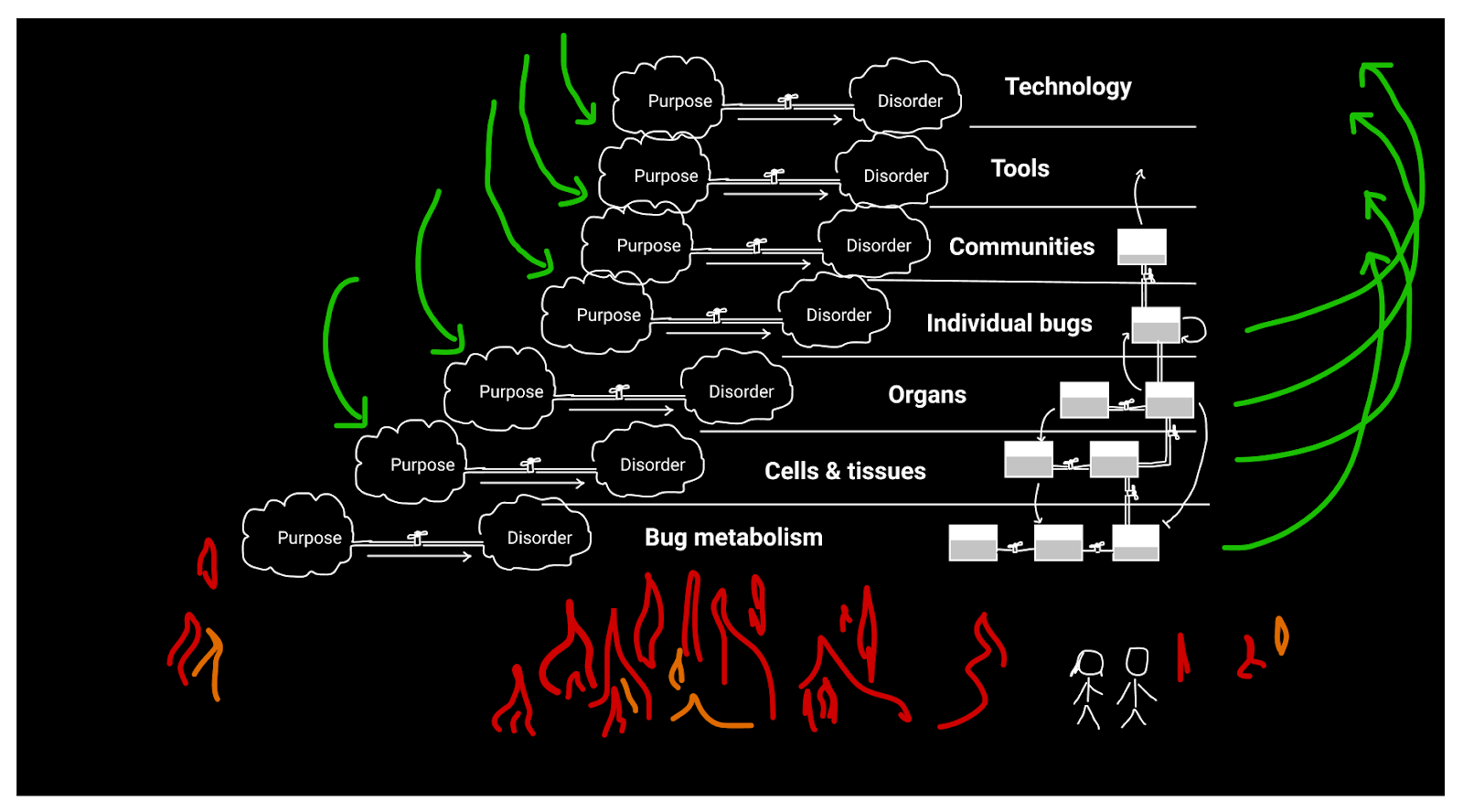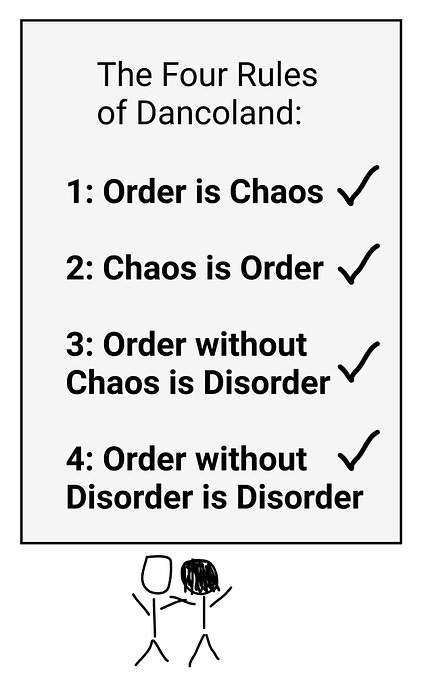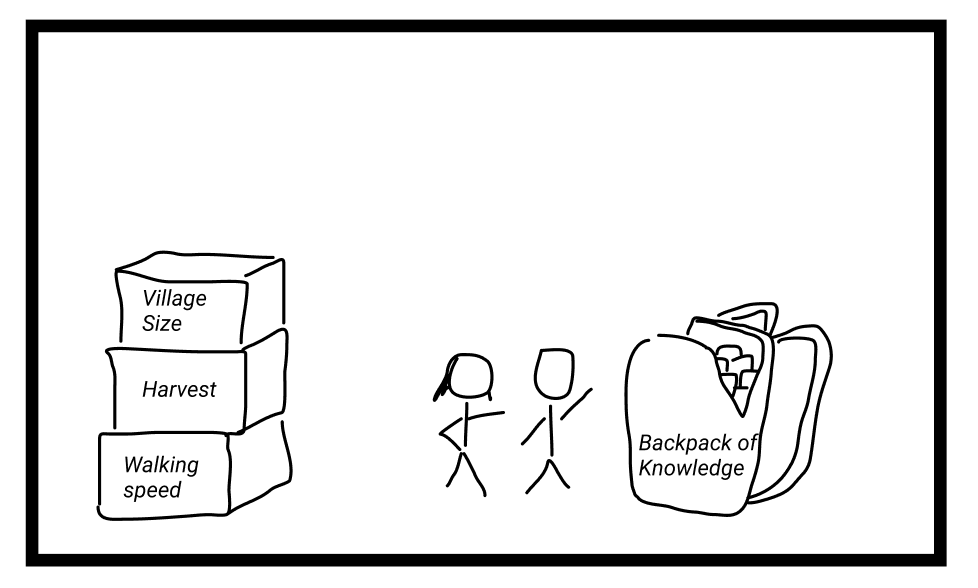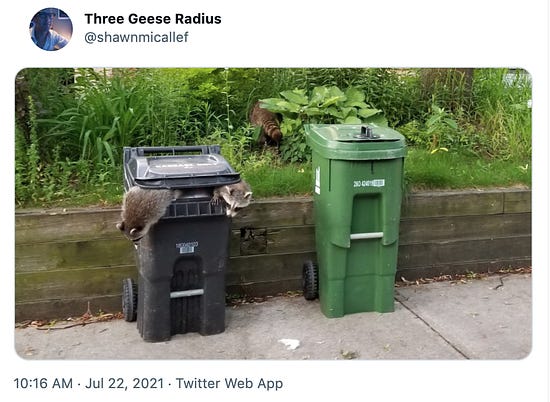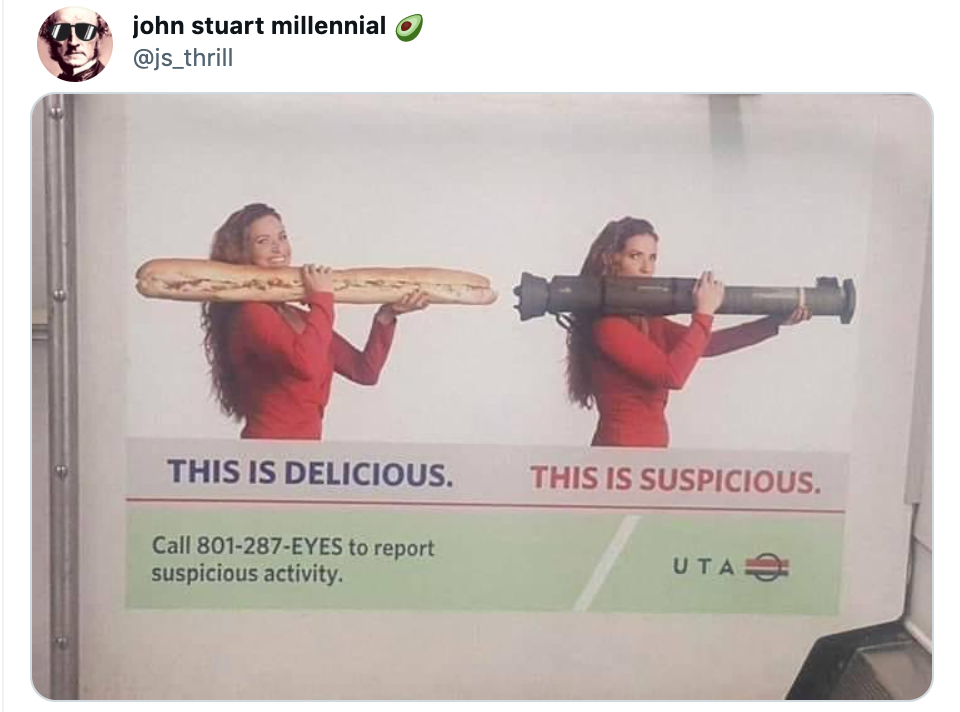Alex Danco's Newsletter - Dancoland, Part 4: Everything Loops
Welcome back to Part 4 of Dancoland. If you’ve missed any previous chapters, you’ll need to read those first. Dancoland, Part 2: Just-So Stories Dancoland, Part 3: Thinking in Layers Today’s Chapter will be the second-to-last one. Next week we’ll conclude. Student: Okay, I think I’m ready. I’m going to try to get all the way through the logic of how Dancoland works. Teacher: I can’t wait. Let’s hear it. Student: So, over the course of our journey together, you’ve shown me different systems that have found steady states. Before we met, I’d believed that this idea of “steady state” was somehow synonymous with the idea of “equilibrium”. But that was wrong: systems find their orderly steady state when they’re out of equilibrium, because they flow. They’re in motion. They have a purpose. That makes sense to me now. But there’s one adjustment I want to make to this idea. And that’s to clarify something important: steady state doesn’t mean static, either. These systems aren’t flowing monotonously; it’s more like they’re breathing. They’re looping. Think about every system we saw together: the farm, the nomads, the market, the bugs. All of these orderly systems are actually looping. The farm loops each year through growing, harvesting, regenerating, and planting seasons. The market loops each day through setting up, trading bustle, cleaning up, and preparing for the next day. Teacher: I’m listening. This feels promising. Student: Looping systems have one big rule. At the end of the loop, you have to end up back where you started. Something gets accomplished in between - things move through the system, like nutrients move through plants and into harvests. But at the end of the loop, the farm is back to where it started. Year after year, the farm flows consistently, and it loops persistently. That’s why we say the farm has a consistent purpose. It loops in a way that accomplishes something, while repeatedly returning to where it started. This idea got harder to follow when we started talking about the bugs. The bugs reproduce and evolve through positive feedback. I really understood how the bugs had purpose, and how that purpose coexisted with - and often, challenged - the other systems in the environment around the bugs. But those other flowing systems in the environment around the bugs are trying to loop too. By purposefully making more and more of themselves, the bugs challenged and sometimes dominated the other loops, and threw those loops off into new directions. That’s when, if you remember, I said that one sentence where you interrupted me; you said stop, this is really important to get right. Teacher: I do remember that. Student: I said, “The fact that bugs can perpetually make more of themselves in a predictable way - feels inseparable from the environment around them being unpredictable.” Teacher: Correct. Student: Remember how much I struggled here? I was having a hard time superimposing the idea of order - (“like causes like, predictably perpetuated, forward in time”) and chaos (“small inputs unpredictably cause massive consequences”). It’s like, are the bugs making the world more predictable, or unpredictable? But then I figured it out, and the breakthrough came from a surprising place. It’s such a simple answer, it was hiding right there, in plain sight. And now I know how to show it to you. Teacher: How so? Student: Come walk around with me. The teacher came over, and they resumed walking together. Student: You see, this whole time, we’ve been walking around. At first I was just enjoying the exercise, but I began to enjoy seeing what we’ve drawn together, and what we’ve learned, from all of these different vantage points. But then just now, I realized something. Come over here, step into this middle loop with me. From the point of view of the purposeful bugs, what do you see when you look out? Teacher: I see chaos. Everything around me is changing all the time, in unpredictable ways. My purpose is chaotic. Student: Okay, now let’s walk out of the loop, and look back in. Now what do you see, when you look at where you just were? Teacher: I see order. I see the relentless, predictable drive of the bugs, who keep looping and looping with consistent purpose. The purpose is orderly. Student: And what does that tell you? Teacher: It tells me that… oh hey! I see it now! Order and Chaos are just two different perspectives on the same thing! When we say “Order” that means Purpose, from the Outside Looking In. And when we say “Chaos”, that means Purpose, from the Inside Looking Out. Student: I’m thrilled this is resonating. You never know if something actually makes sense until you can get someone else to explain it back to you. Here’s how I understand it: The ideas of “Order” and “Chaos” aren’t opposites at all. They’re both describing the same thing, but from mirror points of view. They’re describing purpose - the drive of a positive feedback loop in a world of other driven loops. From the inside perspective, purpose feels like chaos - the more purposeful the loop, and the harder you drive the loop, the more unpredictable the world around you will feel. Everything changes around you, in ways you can never anticipate or even control. But from the outside perspective, looking in, purpose feels like order - the more purposeful the loop, the more orderly the universe feels, because you can look at the positive feedback loop driving its flow forward, and driving its purpose forward. From the outside, you recognize purpose as order: the steady state of a non-equilibrium system. I’m sure you’ve had experiences like this - where from the inside it felt so chaotic, but from the outside, it appeared so inevitable. That’s what purpose is. Teacher: I think I’m going to call it. We’ve figured out the first rule. Student: That’s right. The first rule of Dancoland: Order is Chaos. I think we can check that one off: Order is Chaos, because they both mean purpose - but from two different perspectives. And you know what? I feel like a weight has been lifted off of my shoulders a little bit. I feel like “cause” and “effect” just became a little less important. Loops don’t have a start or an end; they don’t have a cause or an effect. They have a purpose. I think I’m finally letting go. Teacher: Nice! Feels good. Student: Sure does. I feel like getting the first rule is the hardest step; and now we’re in good shape to work through the other three. In fact, you know what, the second rule is actually just a stone’s throw away. “Chaos is Order”. I bet you that isn’t just a carbon copy of the first rule; it’s there for a reason. Teacher: I bet you this has to do with where loops come from. Student: You’re right. In fact, we already basically spelled this out, when we talked about layers emerging. Remember when we said, At some point, some aspect of the bug’s metabolism started making more of itself, and more and more, and at some point it made sense to call that a “cell”. And then as the cells made more of themselves, they became organ systems and then bugs and then bug communities. These looping layers, with their own purpose, had to emerge out of somewhere. They had to “escape” the world that existed before them. For a new layer to emerge that’s actually new, it has to have come from a starting point that has never existed before. That’s why chaos is so useful. Positive feedback loops are where “new” comes from. The drive of the purposeful loops in the existing world - which seem like such a strong barrier to change, if you’re looking from one perspective - is also what gives birth to change, if you look from another perspective. Teacher: You have to break out of loops in order to enter new spaces. Student: That’s right. That’s why chaos is such an important part of what’s going on. Nothing is permanent, because purpose creates the conditions for new purpose. Teacher: I like that. Purpose creates the conditions for new purpose. Student: Chaos is order. There’s number two. Let’s check it off. Teacher: Done. But that leaves three and four. They seem trickier. “Order without chaos is disorder.” And “Order without disorder is disorder.” Student: You know what? I think I know what these are all about, too. But to answer them, we have to talk about disorder, and we have to finally address the meaning of the Furnace of the Universe. Teacher: Let’s do it. Student: So here’s the thing. As we’ve been talking about Order and Purpose, it’s been bugging me that we’d never actually talked much about Disorder. What even is it? My instinct was to say, “Disorder must be the opposite of order.” It seems sensible and obvious. But then I thought back to how I used to think that Chaos was the opposite of order, too. And that sure wasn’t true. Order and Chaos both mean Purpose, just from mirror points of view. So then what is Disorder? Is it Anti-purpose? Un-Purpose? Lack of purpose? It’s none of those things. Disorder is SPENT Purpose. Teacher: Disorder is Purpose that’s been consumed? Student: That’s right. Let’s go back to our loops. The farm, the nomads, the market, the bugs. All of these loops are productive: they do something useful in the world. And they’re all perpetuating: they end up back where they started. That’s what makes them loops. But they also consume something. They’re not perpetual motion machines. Each time the farm goes through the loop, it consumes the energy of the sunlight, the nourishment of the rainfall, and the effort of the villagers. Each time the market goes through the loop, it consumes the demand of the buyers, the arrangement and preparation of the vendors, and on a long enough scale, even the durability and structural integrity of the building. Every loop produces disorder. Every loop consumes purpose. Teacher: Disorder is the remnant of consumed purpose. Student: That’s the meaning of the furnace of the universe. The universe continually spends its purpose. I remember when you showed me the furnace at the very beginning of our time together, I could only see it as a bad thing. You told me: We see the world as structured and orderly, but that structure is temporary. Over the long run, all of the organized structure in the world slowly but irreversibly breaks down into perfectly uniform disorder. Mountains eventually grind down into dirt; plants and animals die. Friendships end, social contracts dissolve. Kingdoms eventually fall away and are forgotten. Even the sun will run out one day. It’s like that riddle from The Hobbit. Nothing survives time, in the long run. Maybe that’s how we should think about time. Time is the forward motion of purpose. Purpose is created, and purpose is spent. It moves forward, in one direction: the direction of time. Teacher: Time is the forward motion of purpose. I guess that’s the final nail in the coffin for cause-and-effect thinking, isn’t it. Student: That’s right. Cause and effect will fool you: in a world where everything is looping, there is no cause or effect. But there is purpose, and purpose moves in one direction: it is created, and it is spent. Teacher: And it’s renewed, too. Student: Well, it can be. That’s up to us. The systems that persist, like the villagers and the nomads, persist because they’ve found an arrangement of stocks and flows and surrounding loops that both consumes and renews its purpose. Think about the difference between the villagers and the nomads: they are similar systems with similar purposes. They’ve both found different ways of feeding themselves, with their own looping balances of stocks and flows that renew themselves season after season, and re-consume their renewed purpose. Persistent loops must renew their purpose. They’re like muscles: the purpose of your muscles is for you to use them. How you use that purpose is up to you. You can spend them in a way that renews their purpose, by using them purposefully, or spend it in a way that doesn’t, by doing nothing. The same goes with each of the loops we saw on our journey. The farm ends its growing season exhausted; in disorder. The market ends its day messy; spent; disordered. But they loop back again, the next day and the next year, not because they’re just passively orbiting around and around, but because their purpose is continuously renewed by the participants around them, as they carry out their own loops and their own purposes. Furthermore, sometimes we act with enough purpose that we chaotically rearrange the participants and loops around us, until a new loop gets established, which finds its own purpose. Like the market found its purpose on top of the farm, or how the many layers of the bugs evolved on top of one another. In consuming their own purpose, loops regenerate other purpose, and sometimes even create new purpose that has never existed before. Teacher: Loops carry out their work by spending purpose. They regenerate through other loops spending their purpose. Student: That’s exactly right. Hey, I think it’s time to finish off our four rules. I think we’re ready. Teacher: So what did we have left? Order without Chaos is Disorder, and Order without Disorder is Disorder. Student: Let’s try the first one. Order without Chaos is Disorder - so that means: Purpose - if it’s never directed outwards - is Spent Purpose. That makes sense to me. If purpose is not directed outward onto the surrounding world, it is simply spent, and nothing more. It’s never renewed, because there’s never any reason to do so. If you do things but don’t tell anyone, then your purpose can only really be consumed once. But if you do things and tell people, your purpose can self-renew. And how about the second one? Teacher: Order without Disorder is Disorder - so that means: Purpose - if you don’t spend it - is spent. Yeah, that’s another way of saying, “Use it or lose it”, just even more clearly this time. If you never spend your purpose, then it goes away all the same. Student: So there we have our four rules: Order and Chaos are mirror perspectives of Purpose. Purpose creates the conditions for more Purpose. Purpose, if you don’t direct it outwards, is Spent Purpose. Purpose, if you don’t spend it in the first place, is Spent Purpose. Teacher: Looks great. I love it. Student: And you know what? Now that I look around at all these boxes around us, which came in my backpack of knowledge, I finally realize what they are. All of these boxes, together, represent everything I know, and everything I’ve learned and experienced over my lifetime. And each one of them - if you open them up - has a purpose. There aren’t any just-so-stories in here at all. Nothing here is a cause or effect. There are just boxes and boxes full of everything I know, and why it’s there, and what’s their purpose in the world. That’s what I’ve been accumulating my whole life. I just didn’t realize it until now, until you brought me here. He looked over at his teacher, who was beaming with pride. She was clearly so happy for him. But at the same time, he couldn’t help but notice some sadness in her eyes, too. Student: I don’t really know how to ask this, but why did you come here? You never actually told me why you showed up in my dream. Next week’s episode will be the last in this series. See you then. Before we go, here’s this week’s Tweet Caption Contest: First, congratulations to our winner, Friedrich from Toronto, for last week’s winning caption: “This return to the office policy is a real drag. See you tonight, darling!” -Friedrich, from Toronto Our current finalists, for voting consideration: “My mom (left) vs. my wife (right) when I crack a joke at Thanksgiving dinner.” - Sean, from Berlin “Jokes aside, folks, these tubes will be used to transport everything *except* the internet.” - Daav “We’ve reached a compromise for the cryptocurrency amendment: we’re going to tax whatever NFTs are instead.” - Jill And here’s this week’s tweet, for your submission: You can vote and submit your responses here. Have a great week, Alex If you liked this post from Alex Danco's Newsletter, why not share it? |
Older messages
World-Building and the Early Internet, with Jim O'Shaughnessy
Monday, August 9, 2021
Dancoland Season 3, Episode 17
Michael, Dwight and Andy: the Three Aesthetics of the Creative Class
Monday, August 9, 2021
Dancoland Season 3, Episode 18
Dancoland, Part One
Monday, August 9, 2021
Are you ready? Ok, let's begin. One night, a young man who we'll call Student went to sleep and fell into a strange dream. Student: Huh, where am I? I don't recognize this place. In front
Dancoland, Part 2: Just-So Stories
Monday, August 9, 2021
Welcome back to Dancoland. If you missed part one last week, read that first. Teacher: Ok, let's examine some of those things you told me about your village. I'd love to see what assumptions
Dancoland, Part 3: Thinking in Layers
Monday, August 9, 2021
Welcome back to Dancoland. If you aren't caught up, head here to start at the beginning. Last week, we'd learned how different systems can find their own steady states, and how order emerges
You Might Also Like
3-2-1: On the secret to self-control, how to live longer, and what holds people back
Thursday, February 27, 2025
“The most wisdom per word of any newsletter on the web.” 3-2-1: On the secret to self-control, how to live longer, and what holds people back read on JAMESCLEAR.COM | FEBRUARY 27, 2025 Happy 3-2-1
10 Predictions for the 2020s: Midterm report card
Thursday, February 27, 2025
In December of 2019, which feels like quite a lifetime ago, I posted ten predictions about themes I thought would be important in the 2020s. In the immediate weeks after I wrote this post, it started
Ahrefs’ Digest #220: Hidden dangers of programmatic SEO, Anthropic’s SEO strategy, and more
Thursday, February 27, 2025
Welcome to a new edition of the Ahrefs' Digest. Here's our meme of the week: — Quick search marketing news Google Business Profile now explains why your verification fails. Google launches a
58% of B2B Buyers Won't Consider You.
Thursday, February 27, 2025
Here's why, and how to fix it. ͏ ͏ ͏ ͏ ͏ ͏ ͏ ͏ ͏ ͏ ͏ ͏ ͏ ͏ ͏ ͏ ͏ ͏ ͏ ͏ ͏ ͏ ͏ ͏ ͏ ͏ ͏ ͏ ͏ ͏ ͏ ͏ ͏ ͏ ͏ ͏ ͏ ͏ ͏ ͏ ͏ ͏ ͏ ͏ ͏ ͏ ͏ ͏ ͏ ͏ ͏ ͏ ͏ ͏ ͏ ͏ ͏ ͏ ͏ ͏ ͏ ͏ ͏ ͏ ͏ ͏ ͏ ͏ ͏ ͏ ͏ ͏ ͏ ͏ ͏ ͏ ͏ ͏ ͏ ͏ ͏ ͏ ͏
Teleportation, AI Innovation, and Outgrowing 'Good Enough'
Thursday, February 27, 2025
Oxford scientists have achieved quantum teleportation of logic gates, AI advances include France's €109B investment, Unitree's eerily smooth robotic movements, and DeepMind's Veo2 video
🧙♂️ Quick question
Thursday, February 27, 2025
Virtual dry-run of my event ͏ ͏ ͏ ͏ ͏ ͏ ͏ ͏ ͏ ͏ ͏ ͏ ͏ ͏ ͏ ͏ ͏ ͏ ͏ ͏ ͏ ͏ ͏ ͏ ͏ ͏ ͏ ͏ ͏ ͏ ͏ ͏ ͏ ͏ ͏ ͏ ͏ ͏ ͏ ͏ ͏ ͏ ͏ ͏ ͏ ͏ ͏ ͏ ͏ ͏ ͏ ͏ ͏ ͏ ͏ ͏ ͏ ͏ ͏ ͏ ͏ ͏ ͏ ͏ ͏ ͏ ͏ ͏ ͏ ͏ ͏ ͏ ͏ ͏ ͏ ͏ ͏ ͏ ͏ ͏ ͏ ͏ ͏ ͏ ͏ ͏ ͏
A Classical Way to Save the Whales
Thursday, February 27, 2025
But what song, we don't know.
I'm investing in early stage AI startups
Thursday, February 27, 2025
Hi all, I'm investing in early stage AI startups. If you know someone who's looking for easy-to-fit-in checks from helpful founders (happy to provide references) I'd love to chat. Trevor
🧙♂️ [NEW] 7 Paid Sponsorship Opportunities
Thursday, February 27, 2025
Plus secret research on La-Z-Boy, Android, and OSEA Malibu ͏ ͏ ͏ ͏ ͏ ͏ ͏ ͏ ͏ ͏ ͏ ͏ ͏ ͏ ͏ ͏ ͏ ͏ ͏ ͏ ͏ ͏ ͏ ͏ ͏ ͏ ͏ ͏ ͏ ͏ ͏ ͏ ͏ ͏ ͏ ͏ ͏ ͏ ͏ ͏ ͏ ͏ ͏ ͏ ͏ ͏ ͏ ͏ ͏ ͏ ͏ ͏ ͏ ͏ ͏ ͏ ͏ ͏ ͏ ͏ ͏ ͏ ͏ ͏ ͏ ͏ ͏ ͏ ͏ ͏ ͏
• Relax with a Great Book • Book Deals • Free • KU • Paperback •
Thursday, February 27, 2025
Reading Deals Here! Fiction and Non-fiction Book Deals for You! ContentMo's Books Newsletter

